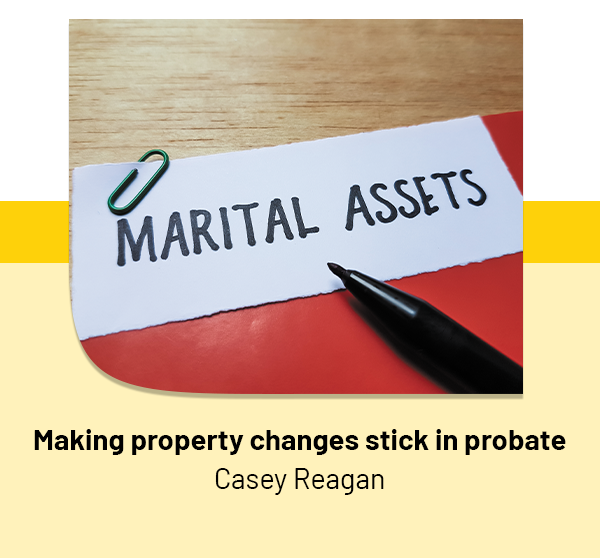Wills, Estates & Trusts,
Probate
Oct. 15, 2025
Making property changes stick in probate
See more on Making property changes stick in probate




The principles of community property and separate property often impact legal proceedings outside the family law context. Characterization of an individual's property may become a crucial issue on death, in probate estates both testate and intestate and in trust administration. For example, a surviving spouse is entitled to receive all community property of a decedent in an intestate estate, while that same spouse's separate property share may be as low as one-third. As another example, marital A-B trusts, i.e. those divided into irrevocable and revocable sub-trusts on the death of the first spouse, often require the deceased spouse's irrevocable sub-trust to be funded with the entirety of that spouse's separate property and for the community property to be split in equal shares. A mischaracterization of marital property can significantly alter the inheritance to which each spouse's beneficiaries are entitled.
In situations like this, heirs, beneficiaries, attorneys, and courts must often investigate the time and source of acquisition of each of a decedent's assets to establish marital property characterization after-the-fact, investigation often complicated by incomplete record-keeping, sale, purchase, and other changes in form of assets and the passage of time. This process can become a costly and combative subject of probate litigation.
But there is a way for spouses to reduce controversy for future disposition of their assets as part of their estate plan. Some estate planning documents include transmutation language through which the spouses clearly establish the character of property at the time their joint estate plan is created. Transmutation requires a writing, signed by the spouse whose interest in the subject property is impaired, which contains language that unambiguously expresses that the marital character of the subject property is being changed. Any agreement altering the character of marital property is subject to a presumption that the advantaged spouse unduly influenced the impaired spouse by virtue of their fiduciary duties owed to one another as spouses, which may be overcome by evidence the agreement was freely and voluntarily entered will full knowledge of the facts and the effect of the transaction. Trusts (or agreements drafted alongside trusts) can constitute such writings, but case law demonstrates that the language of the document and the circumstances of its execution are critical factors in determining whether a writing effectively transmutes the character of property.
In In re Marriage of Lund, 174 Cal.App.4th 40 (2009), the appellate court reversed a lower court ruling by holding that an agreement executed alongside the spouses' joint estate planning documents constituted an effective transmutation of all of the husband's separate property into community property. The agreement provided that the husband held property of "substantial value" entering the marriage, and that "[t]he Husband, for estate planning purposes desires to convert said separate property into community property." in a section entitled "Converted Property," the agreement further provided in part that, "[a]ll of the property, real and personal, held in the name of Husband having its origin in his separate property no matter how received and/or earned, is hereby converted to community property of Husband and Wife..."
The appellate court rejected husband's argument that this agreement was entered solely for estate planning purposes and therefore should not be effective on dissolution, because the language supporting a present transmutation was unambiguous. It also reversed the lower court's ruling that the agreement was presumed to be the product of undue influence based on the short length of the agreement and husband's attestation that he read the agreement and understood its context.
By upholding the subject agreement, the appellate court in Lund provides a guide for how spouses can effectuate transmutation in the context of an estate plan. But there are potential pitfalls to consider as well. First, the transmutation language must clearly indicate an intent to alter the character of the subject property. Language in a trust that property transferred to it "is the community property" of the spouses is insufficient because it does not state an intent to alter the property character, whereas language that property transferred to a trust "'becomes' or 'is changed into' the community property of the parties" may constitute effective transmutation. In re Marriage of Starkman, 129 Cal.App.4th 659, 662, (2005) (emphasis added).
Second, on death, the evidentiary presumption that real property is presumed to belong to its title owner supersedes the presumption that property acquired during marriage is presumptively community property. A separate transmutation agreement may impact this analysis, as may the aforementioned presumption of undue influence in transactions during marriage that advantage one spouse over another. Effective titling of real property should be consistent with the spouses' agreement as part of their estate plan.
Transmutation is a powerful tool that may provide substantial guidance and clarity to the beneficiaries of settlors when it comes time to fund or distribute their assets. However, its power should be exercised carefully and precisely.
For reprint rights or to order a copy of your photo:
Email
Jeremy_Ellis@dailyjournal.com
for prices.
Direct dial: 213-229-5424
Send a letter to the editor:
Email: letters@dailyjournal.com


